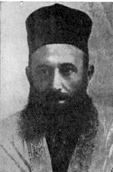
He belonged to that small number of cantors, who exhibited themselves at full capacity right on their first performance, and his distinguished face added a lot to his great personality.
He was born in 1882 to his father Rabbi Netanel, the Rabbi of a town called Zhitel, in Grodno region, the author of “refreshing”, “belief in the resurrection” and “The Garden of myrtle”. At 36 years old Yosef Dov was accepted as a student to the famous Nobrdok yeshiva, where he studied singing from the local cantor Boyarsky. By the age of twenty he studied at different Yeshivas in Lita, and was ordained by the Gaon Rabbi Mordechai Slonimr. But his heart was drawn to the cantorial, and he learned Chazanout from Cantor of Smorgon, Simmel Masbitzki, where he systematically studied reading and writing musical notation, the gamut of voices, and received good technical musical training. In 1904 he was accepted, still being a young man, to the synagogue of Bobruisk as a poet and second cantor (the renowned Arie Leib Rothman was first cantor). He sang with famous cantors in southern Russia for a long time and had much success.
After getting married in 1907, he was invited to pass before the Ark in the Slonim urban synagogue and in 1912 was accepted as an urban cantor at the Great Synagogue of Siedlce, were he was preceded by cantors artists, such as Seidel and Yaakob Robner and Tikotinski, and served as cantor in Siedlce for 23 years, until he immigrated to Eretz-Israel. He possessed a lyrical baritone voice with coloratura and was an excellent prayer and cantor. His wonderful prayer has always attracted a large audience, even on winter Saturdays. When he prayed before the page the synagogue in Siedlce was full to the brim. He has arranged a chorus and the audience enjoyed the performances, but due to lack of funds it dispersed.
He was very much liked and respected in Siedlce, being a Bar Orian, knowing Hebrew, versed in old and new Hebrew literature and knowledgeable in Russian literature, polite and scholar without a flaw on his clothes. A disciple of F. Minkobsski from Odessa, who knew the traditional chazzanut and Cantor literature of David Nowakowski, Shlomo Kashtan and their colleagues. His figure before the ark was convincing being most erect, his movements precise, and he especially captured the audience with spiritual tension which he perfected. He knew by heart works written by the gifted creators: Weintraub, A.B. Birenbaum, etc. ; and he designed the pieces sung as if he was the author, with inspirational force and joy of creation exciting the audience from the beginning of the prayer to the utmost. He continued his glorious golden chain of Israeli poets and cantors illuminating the darkness of their exile life with the heat of their hearts.
And now he was determined to put an end to life in exile and go to the Holy City of Jerusalem. The Jewish community in Siedlce set him a farewell-party, and the whole town participated. On his departure day, all the city’s citizens came to the train station to bless him “Godspeed”. He was a member of the cantors and conductors union in Poland, participated in the national Congress in Warsaw and was elected to the National Council.
His appearance in Eretz-Israel on 1935 made an impression. He went before the Ark in the “Ohel Shem” in Tel Aviv and in large synagogues in Jerusalem, performed in the Chazzanut songs program on “Voice of Jerusalem”, was a member of the Cantors, conductors and lovers of religious poetry in Eretz-Israel union, and hardly missed a visit to the cantors club in Jerusalem and take part in lively debates on issues of cantors in Eretz-Israel and around the world. At his home he had a library of the best cantor literature of A.B. Birnbaum, whose work he liked very much, especially the Rhapsody Talmudic composition of “what kindling” and the works of Yeruham Hakatan, Nisan Belzer and others, and even created his own recitatives for prayers in the spirit of tradition. The cantors of Jerusalem considered him to be a creative power and full of energy, putting the younger ones to shame. He was a good conservationist, and it was interesting to hear his tales of chazzanut life and the lives of the great men who served as cantors in Russia’s cities. He even educated young cantors in traditional Hazanouth, and many of his students serve in distinguished positions in the Jewish communities of Brazil, Argentina and more.
He was blessed to see most of his family in Eretz-Israel, involved in life of Torah and Labor and the resurrection of Israel, and whenever he remembered he managed to come and sit in Jerusalem he blessed “Shehecheyanu”. During his long illness he had musical enthusiasts and cantors frequently visit him and spent hours in pleasant conversations about building the country and the revival of cantors in the country.
